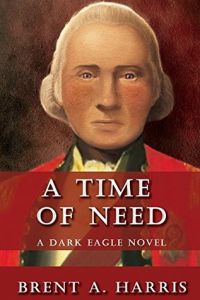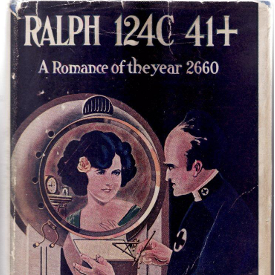 Many alternate historians treat George Washington as the linchpin for a successful American Revolution. Remove him from history, perhaps through an early and unexpected death, and you essentially doom America to everlasting subservience to the British crown (the horror!). I find ideas like that rely too heavily on the Great Man Theory of history and ignore all of the other factors that led to an American victory. Case in point: A Time of Need by Brent A. Harris, the first Dark Eagle novel.
Many alternate historians treat George Washington as the linchpin for a successful American Revolution. Remove him from history, perhaps through an early and unexpected death, and you essentially doom America to everlasting subservience to the British crown (the horror!). I find ideas like that rely too heavily on the Great Man Theory of history and ignore all of the other factors that led to an American victory. Case in point: A Time of Need by Brent A. Harris, the first Dark Eagle novel.
In this alternate history, General Edward Braddock is not killed, only wounded, at the Battle of the Monongahela and was able to witness George Washington rally the remnants of the British and Virginian forces into an organized retreat. Impressed by his bravery and quick thinking, Braddock sponsors Washington’s career in the British. Thus when the American Revolutionary War breaks out, Washington remains a loyalist and goes into battle against his countrymen in a red coat commanding a force of Hessian mercenaries.
While the book cover and the preceding paragraph might make you think this is a story about Washington struggling with his conflicting loyalties to the British crown and to his fellow countrymen, you would only be half right. Although Washington remains an important point of view character, much of the story focuses on Benedict Arnold, a name synonymous in American history with “traitor”. Many forget, however, that Arnold was an important Revolutionary leader and was primarily responsible for the American victory at the Battle of Saratoga, a turning point in the war. Arnold, however, became disillusioned with the cause after repeatedly being passed over for promotion and having to constantly defend himself against false accusations of corruption. America’s alliance with France and the failure of Congress to accept a British peace proposal in 1778 were the final nail in the coffin for him and he turned on his countrymen.
In this alternate timeline, however, without Washington around, Arnold is given more opportunities to shine. With America getting more and more desperate as victory continues to elude its grasp, Arnold is given a blank check to win the war by any means necessary…even if this means sacrificing liberty to one man’s ambitions.
Now some of you might remember Brent Harris as the co-author of the 2016 Sidewise Award nominated short story, “Twilight of the Mezozoic Moon”, which I reviewed for Amazing Stories. I found this tale of time traveling dinosaurs who accidentally caused their own extinction to be one of the best alternate history short stories in recent memory and I was looking forward to seeing him tackle something more plausible. In general, he didn’t disappoint me.
A Time of Need is an excellent novel in how a different personality commanding America’s forces could have shaped the outcome of the American Revolution and the future path the young United States would have taken. I found Arnold to be a complex character who truly symbolized the light and dark sides of the conflict. Arnold had moments where he was a complete scoundrel, but he also had moments where I sympathized with him and what he was trying to accomplish. This was a man who was paying for the sins of his father and who truly was smarter then most of the other American generals, but because of his reputation and uncouth personality, was ignored and sidelined until America’s darkest hour.
In fact I found Arnold’s portrayal to be a lot more interesting then what we saw from Washington. Don’t get me wrong, Harris’ portrayal of a Washington who was only trying to do what was best for his country (which includes the entire British Empire and not just the colonies) to be well-written. In A Time of Need, Washington struggles to focus on winning the war while convincing the British that the Americans are their countrymen and not savages who need to be beaten in submission. Unfortunately, Washington finds patronizing condescension from his British compatriots and outright hostility from Americans. Nevertheless, I found Washington was too chivalrous at times, which perhaps wasn’t out of character, but when compared to bad boy Arnold it did make his passages the less interesting parts of the story.
Otherwise A Time of Need was fine. I like reading alternate histories that change history in unexpected ways. With the American Revolution, authors tend to just have the British win when they want to write an alternate history about it, but Harris managed to do something original with how Arnold secured American independence. That said, I do have an issue with one aspect of the ending that I don’t want to spoil so if you don’t want anything ruined for you, skip to the last paragraph.
So Arnold manages to trap Washington’s army in Rhode Island securing a victory that moves peace talks with Britain along. In this alternate timeline, only the nine states north of Virginia gain independence in a country known as the “Free States” led by President-General Benedict Arnold. The four southern states, however, remain under British control, although its mentioned there is a still a rebellion ongoing there. All of that was fine and in fact reminds me a lot of the online timeline “Dominion of Southern America“. What bothered me was the mention that France got the Ohio River Valley (which I took to mean in this context as our timeline’s Northwest Territory, but someone can correct me if I am wrong). This got me asking: why? France had lost almost their entire colonial empire in North America to the British and Spanish after the French and Indian Wars. They wouldn’t manage to get Louisiana back until 1802. Thus if France had the Ohio River Valley…how did they reach it? The territory would be completely surrounded by foreign powers with no access to the sea. Seems like a bad position to be in, but maybe I am missing something in the book that will explain this discrepancy.
Anywho, Harris’ A Time of Need definitely earns a recommendation from me. It was a (mostly) plausible look at how one man’s ambition could have changed the entire course of history and I eagerly look forward to the next installment.









A smashing read, really enjoyed it. What I also liked was the way you get to see how it affects the rank and file, and how some of the troops are forced into moral choices during the course of the story. It doesn’t shy away from some of the more terrible aspects of American history too – and ends at a point where I’m really wanting to know what happens next.